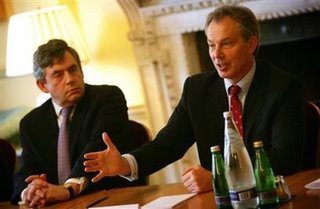David Cameron would love the chance to become the next Prime Minister. Making noise–the baying of the powerless Leader of the Opposition in the House of Commons, remember: the policies of the “shadow cabinet”–about the environment is all quite impressive, but then we know you Tories aren’t like these red Republicans out here stateside. And why do we know that? Well for one thing Bush’s apparatus refused to even meet with the Conservative Party delegation to the 2004 Republican Convention in New York.
That episode was just more proof of the power of the enormously ruthless and clever Tony Blair, the brightest European politician of his generation and an embarrassingly brainy contrast to George W. Bush. Even as Tony Blair held onto power (with a reduced majority, however) in 2005, Romano Prodi’s win in Italy this year represents the second domino in the fall of right-wing governments from the “Coalition of the Willing” in Europe. After Spain’s Jose Maria Aznar failed to see his replacement elected in 2004, former European Commission Prodi took the left to power, replacing underworld figure Silvio Burlusconi. But as Blair’s Labour government is theoretically on the left, does that leave him immune to the same discontents, even as British guarded Basra has seen security problems and the NATO force is taking on a difficult area of Afghanistan? This problem is probably the largest foreign policy issue facing Blair’s government as it runs out of support due to a range of scandals.
“Cash-for-honours” is an inside-Westminster kind of scandal. Those not interested in the arcana of Lords reform proposals and English election law may find it to seem like a relatively minor influence-peddling plus fund-raising operation.
Dr. John Reid, who seemed to be casting aspersions on the relevance of the Geneva Conventions (regrettable especially for an ally often presuming to lecture the US on human rights issues) while Defence Minster, is now charged with running the Home Office. Whether putting that loyal Blair acolyte in charge of that enormous, secretive police department will calm the political uproar over perceptions of incompetence (civil servant and ministerial) is debatable.
Tax credits, education funding and the NHS are also recent areas of debate. These more than others have to do with Chancellor of the Exchequer Gordon Brown, who will have to be seen as sorting problems out in domestic policy before he can take over the Prime Minster’s Office at No. 10 Downing Street.
The strangest scandal involves Deputy Prime Minister John Prescott. Perceived as a Labour man, apparently, by party loyalists, he has been compromised by news of an affair with a staffer, Tracy Temple. When Blair reshuffled his cabinet recently, he took away some of Prescott’s responsibilities. Recently Prescott was filmed playing croquet at a country estate reserved for the Dep. PM. Due to embarrassment, he is now giving up his use of the house. (He gave an interview to the Guardian here.) Prescott seems to be trying to tie his fate to that of Blair–which is a bad sign, as Blair is by now perceived as somewhat damaged goods, and it just shows you how troubled Prescott is right now. When he sat behind Blair during the weekly Prime Minister’s Questions in Parliament, Prescott often seemed to be talking, signaling or joking–perhaps not about the subject at hand, but with enthusiasm. Gordon Brown looks more often like he is quite angry that anyone would dare drag him out of bed and make him listen to Blair. But apparently, in the mysterious rooms of Whitehall it is Brown who is respected perhaps a bit and highly feared whereas Prescott is said to be good at chairing committee meetings, something even less important in Britain than in America.
Due to the series of scandals (whether somewhat media-fed or absolutely genuine, they turned into an embarrassing frenzy that hurt Labour’s image), Tony Blair has to finish out the year by trying to make some progress on domestic issues while giving up his office at the beginning of 2007.
When the comparisons are made with Tory problems in the 1990s with Blair’s government, they are largely laughable. The last nine years have seen remarkable economic stability in Britain, while public services are improving if not good. Gordon Brown, along with Blair, is largely responsible for the sound fiscal management that has helped create conditions for growth in Britain. As much as it is true that Blair is authoritarian (in his taste for detention powers, ID cards and war) and has made many mistakes, a Tory government would not be more liberal-minded and it would be amateur hour by comparison on economic issues. Blair should step aside soon to let Gordon Brown make this case for the 2009 election.
[photo: AP]

